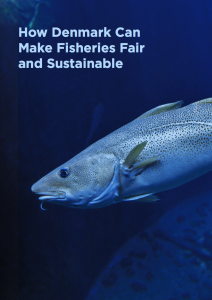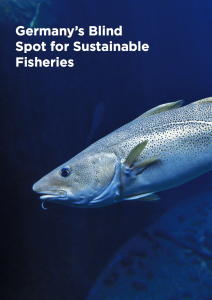Copenhagen, 31 August 2017: As the BALTFISH meeting to discuss Baltic Sea fishing quotas opened today in Copenhagen, environmental organisations urged government officials to avoid pandering to the demands of big business and instead focus on applying EU fisheries law and ending overfishing [1].
As delegates arrived at the meeting at the Danish Agrifish Agency they were greeted by supporters of the Our Fish campaign dressed in cod costumes, displaying a banner that calls on on Baltic governments to “Stop Overfishing”.
“While the BALTFISH deliberations are taking place behind closed doors, European citizens, as beneficial owners of Europe’s fish stocks, have the right to demand that these fisheries are managed according to the law. Our Fish is calling on Baltic governments to stop endorsing overfishing for the benefit of big trawling interests and instead support science-based quotas that will rebuild our fish stocks”, said Our Fish Program Director Rebecca Hubbard.
BALTFISH is a regional body consisting of government representatives from the eight EU nations bordering the Baltic, and is responsible for cooperating on the development of sustainable fisheries in the Baltic Sea. Today’s meeting is key in the preparations of governments to establish a position on fishing quotas for 2018, which will be decided at the October Agrifish Council meeting in Brussels.
The Council of EU fisheries ministers set 2017 fishing limits for four out of ten Baltic fish stocks above scientific limits, including a staggering 3.5 times the scientific advice for Western Baltic Cod, despite the fact that they were teetering on the edge of commercial collapse (1,2).
On August 29th, the European Commission released a proposal for fishing opportunities in 2018 to be considered by BALTFISH and the Council of Ministers, including a ban on European eel due and a rollover of the western Baltic cod Total Allowable Catch (TAC).
“Unfortunately, recent scandals about mismanagement of the Danish system for distribution of fishing rights by the Ministry for Food and Environment, confirm a tendency to prioritize the interests of a few powerful players in the fishing industry. Not only is this a problem for the future of the fishing industry, but also for the environment, as low impact fishermen have been struggling as a result. We urge the new Fisheries Minister, Karen Ellemann, to start restoring Denmark’s broken reputation by fighting to combat overfishing instead of feeding it,” says Magnus Eckeskog, oceans campaigner at Greenpeace.
“We are grateful to the Commission for finally moving forward on safeguarding the eel. Its now up to the Baltic member states to show how they interpret the Common Fisheries Policy and scientific advice on eel, and to commit to phase out a fishery on this endandgered species. It’s a no brainer that this is also the right thing to do across all EU nations,” said Nils Hoglund, Fisheries Policy Officer Coalition Clean Baltic.
German and Danish Governments are also under intense pressure from the trawler-dominated Baltic Sea Advisory Council, who are proposing a western Baltic cod limit of 8,597 tonnes, which includes an extra 3,000 tonnes under the auspices of eastern Baltic cod mixing in the western baltic zones. Environmental NGOs, the European Anglers Association and the Latvian fishing association voted against this quota transfer in the Baltic Sea Advisory Council, as it further threatens the vulnerable western Baltic cod stock and disenfranchises eastern Baltic countries of their fisheries rights. (3)
“Given that the iconic Western Baltic cod’s population is still at the second lowest levels since the early 1980s and the Commission has acknowledged that ending overfishing sooner will deliver the highest economic and social benefits, we are shocked that they have recommended a rollover of the Total Allowable Catch for 2018 that will perpetuate overfishing of these fish stocks. (4) The European Commission and Baltic governments are reminded that EU fisheries law requires an end to the delay and obfuscation around fishing limits in order to restore all fish stocks to healthy levels in EU waters,” concluded Hubbard.
ENDS
DOWNLOADS
Photo/video can be downloaded from http://bit.ly/BALTFISH17photo
SEE ALSO:
New Report Explores How Denmark Can Make Fisheries Fair and Sustainable
New report highlights Germany’s blind-spot for sustainable fisheries
NOTES:
- Western Baltic cod has been overfished for a number of years, so that even after a strong 2016 year class, stocks are still at the second lowest biomass levels since the early 1980s, and outside of safe limits for repopulating to a healthy state. ICES (2017), ICES Advice on fishing opportunities, catch, and effort, Baltic Sea Ecoregion. Published 31 May 2017. Cod.27.22-24
- New Economics Foundation (2017), Landing the Blame – Overfishing in the Baltic 2017.
- BSAC recommendations for the fishery in the Baltic Sea in 2018, retrieved from http://www.bsac.dk/BSAC-Resources/BSAC-Statements-and-recommendations/BSAC-recommendations-for-the-fishery-2018
- Communication from the Commission on the State of Play of the Common Fisheries Policy and Consultation on the Fishing Opportunities for 2018. COM(2017) 368 final
Contacts
Dave Walsh, Communications Advisor, dave@our.fish +34 691826764
Rebecca Hubbard, Program Director, rebecca@our.fish +34 657669425
About Our Fish
Our Fish works to ensure European member states implement the Common Fisheries Policy and achieve sustainable fish stocks in European waters.
Our Fish works with organisations and individuals across Europe to deliver a powerful and unwavering message: overfishing must be stopped, and solutions put in place that ensure Europe’s waters are fished sustainably. Our Fish demands that the Common Fisheries Policy be properly enforced, and Europe’s fisheries effectively governed.
Our Fish calls on all EU Member States to set annual fishing limits at sustainable limits based on scientific advice, and to ensure that their fishing fleets prove that they are fishing sustainably, through monitoring and full documentation of their catch.



Recent Comments